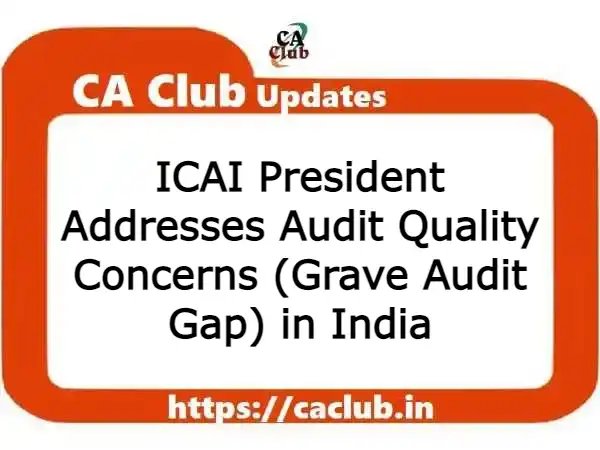Aniket Talati, President of the Institute of Chartered Accountants of India (ICAI), addressed concerns about audit quality in India and responded to claims about a “grave audit gap” in the industry in a recent interview with ET CFO. This article delves into Talati’s thoughts on audit quality, the importance of documentation, the Institute’s stance on audit lapses and disciplinary actions and his message to the CFO community. It also looks at the role of forensic standards in audit quality improvement and Talati’s thoughts on Big Four firm splits.
Audit Quality: Meeting International Standards
According to ICAI President Aniket Talati, audit quality in India meets international standards. He explains that India’s audit standards are nearly on par with international auditing standards, and its ethical standards are also on par with the best international ethical standards. The Institute recognised the importance of audit quality improvement, which led to the establishment of the Centre for Audit Quality a few years ago. The Centre is currently working on tools to help members deliver high-quality audits.
Improvement of Forensic Standards and Audit Quality
Talati recognises the market’s misunderstanding of the roles of auditing and forensic accounting. In order to address this, the Institute established forensic standards, which ensure high-quality forensic reports. To facilitate the delivery of high-quality audits, the Institute strives to keep members up to date on regulatory changes, expectations, and reporting requirements.
Addressing the Alleged “Grave Audit Gap”
Talati didn’t comment on NFRA Chairperson Ajay Bhushan Pandey’s 2022 remarks about a ‘grave audit gap’, however he disagreed to such a situation by saying that if such a gap existed, India would not be experiencing significant economic growth. He stated that there may be an expectation gap, which the Institute is attempting to address by training members to deliver high-quality audits and emphasising the importance of documentation.
ICAI’s Position on Audit Gaps and Disciplinary Actions
Talati maintains that the Institute has a zero tolerance policy for cases of extreme negligence, gross negligence or a lack of due diligence in auditing. The Institute’s disciplinary mechanism addresses reported cases and filed complaints, having previously removed members and promising to continue taking action against such aberrations.
Big Four Firm Splitting: A Commercial Decision
Talati says he has no opinion on the splitting of Big Four firms because these are commercial decisions made by member firms and constituents of the Institute.
Message for the CFO Community
Talati emphasises the importance of CFOs in the industry and commends them for carrying out important duties and responsibilities. The Institute is proud that many CFOs are chartered accountants. The Institute has a dedicated committee for members in the industry and business, as well as awards for outstanding CFOs, to recognise their contributions. The Institute recently held a “40 under 40” programme to recognise 40 young CFOs in the industry.
Conclusion
ICAI President Aniket Talati emphasises the significance of maintaining and improving audit quality in India in order to meet international standards. He emphasises the importance of proper documentation as well as the Institute’s efforts to close any perceived audit gaps. Furthermore, Talati applauds the Institute’s recognition of the critical role that CFOs play in the industry. As India continues to experience significant economic growth, maintaining its position as a global economic powerhouse requires high-quality audits.

While Aniket Talati’s interview sought to reassure stakeholders about the state of audit quality in India, his responses fell short of addressing the true concerns. Instead of providing clarity and transparency, Talati’s statements left critical questions unanswered, potentially undermining trust in India’s auditing profession. To ensure the auditing industry’s long-term credibility and success, the ICAI must engage in open and honest discussions about the challenges it faces.